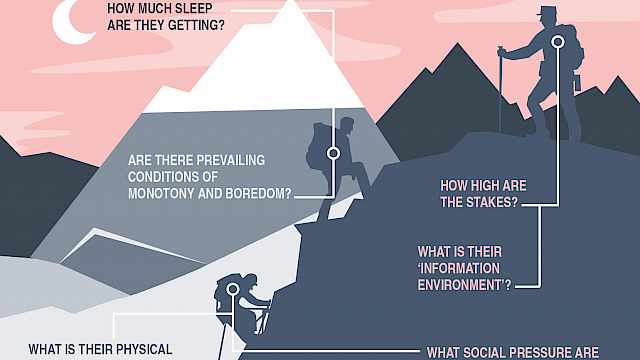Trusted relationships are at the heart of security work: between staff working within security organisations, across organisational and national boundaries, and with members of the public who support security missions, such as covert human intelligence sources (CHIS). Without trust, information may not be shared, organisational relationships may be undermined, and operations may be derailed. Betrayal is a common reason for, and a common consequence of, a breakdown in interpersonal trust. It is also a common feature of intelligence work.
Betrayal in defence, security and policing
Most researchers agree that betrayal occurs when a trusted person, group, or organisation does something (or fails to do something) that causes someone to be harmed or wronged in some way.
Betrayal crops up in many security contexts. It is a characteristic of human intelligence operations: the work of CHIS, spies, and undercover (UC) officers involves gaining or exploiting access to a group that is under investigation and betraying that group by passing on information that the group would prefer to keep secret so that security organisations can frustrate the group’s activities.
Betrayal is often viewed in a negative light. However, some betrayals can be seen as prosocial, such as whistleblowing and witness reporting.
Betrayal is also relevant to personnel security. Organisations that deal with sensitive information must guard against potential threats posed by ‘insiders’ – trusted members of an organisation who, like CHIS, betray their colleagues to a rival group. The most damaging insiders are viewed as traitors by their organisation or nation.
Criminal and terrorist behaviour often features betrayal. Many crimes involve a criminal building trust with their victims in order to betray it, usually for financial gain. Criminals and terrorists also deal with betrayal from each other, so will guard against informers or being ripped off.
Although betrayal is often viewed in a negative light, betrayals such as whistleblowing and witness reporting can be seen as prosocial. These acts involve bravery in stepping forward to report wrongdoing, and exposing illegal, immoral, or corrupt practices. But there is subjectivity and ambiguity here too: one person’s heroic whistle-blower is another person’s traitor, as in the cases of Edward Snowdon or Julian Assange.
Research on betrayal
Although betrayal is rarely the sole focus, studies in security and policing contexts often touch on its nature and impact. For instance, researchers have studied the following:
- Motives and behaviours of CHIS, spies, and traitors (e.g., Akerstrom, 1986; Ben-Yhuda, 2001; Margalit, 2017), revealing the complex pathways that lead to someone betraying others.
- The wellbeing of UC officers, and the psychological impact of betraying others.
- The disengagement experiences of those who leave (betray) terrorist and criminal groups.
- Strategies used by criminals to avoid betrayal, for instance, through the way they communicate, how they establish and verify reputations in online criminal marketplaces, and how they detect and deal with informers.
- The shattering impact on victims of criminal betrayal, particularly in the case of romance frauds.
- How organisations can detect ongoing insider activity or keep out potential insiders through vetting.
Within organisational psychology there is a sizeable literature beyond work on insider threat that deals with themes of betrayal in workplace relationships, often related to breaches of the psychological contract between an employee and their employer. A subset of this research focuses on how organisations can repair trust with their employees after the psychological contract has been breached.
Beyond security contexts and looking across disciplines we find different perspectives on betrayal, and closely related concepts like loyalty, secrecy, deception, and of course trust. Several researchers focus on the experience of intimate betrayal, most often within romantic relationships, including when and how relationships are repaired. Another form of intimate betrayal, that of children by family members, caregivers, and institutions, has been explored in the context of childhood trauma and child development.
Common themes
A sense of betrayal can occur in a range of situations. In most security relevant contexts, betrayal is intentional. In some situations, however, a ‘betrayer’ may not realise that their actions will be perceived by the ‘betrayed’ as betrayal. For instance, a person may believe they have been betrayed but the alleged betrayer may argue that there was no expectation of loyalty or trust, and therefore the ‘betrayal’ was no more than a misunderstanding.
A second common theme is the complex relationship between, betrayal, trust and loyalty. Loyalty implies remaining true to a person, organisation, or cause, despite the existence of attractive alternatives. Being loyal implies you protect and defend the other party and its interests, even at your own expense. Trust does not necessarily require any of this, which means you can trust many different parties, but it is hard to be loyal to more than one. However, loyalty and trust both make someone vulnerable, and it is the exploitation of this vulnerability that is core to understanding the emotional responses to betrayal.
Regardless of context, betrayal elicits intense, often visceral, emotions, often many years after the act. A victim may experience:
- Anger towards the betrayer, and sometimes against others who allowed the betrayer to act.
- Humiliation and shame at having been fooled or manipulated by the betrayer, which can lead to self-directed anger at their gullibility.
- Sadness, disappointment and pain on realising that their trust in the betrayer was not met, or in reaction to a financial or other material loss.
- Confusion, loneliness and isolation as they try to make sense of how a betrayal occurred, and why the possibility of betrayal was not noticed or guarded against.
These emotions are felt across contexts, from romantic betrayals to organisational ones. And people can feel these emotions even when the betrayal was not directed at them. For example, retired CIA officer Jack Devine, talking about finding out that a colleague had volunteered to spy for Russia said:
I knew [Aldrich Ames] personally, went to his wedding. And his is one of those great agonies in life to know, personally, someone you would consider, …a friend or at least be friendly with, that they betrayed their country. So that was the CIA case that was very disturbing to all of us…
The impact of betrayal on the betrayer
Betraying another can generate intense emotions. Some may be positive: pride in exposing wrongdoing, or delight at manipulating others. But negative feelings are common, regardless of whether the betrayal is exposed. Betrayers may fear discovery and the consequences of betrayal: keeping a difficult, embarrassing, or traumatic secret is psychologically stressful. They may feel guilty about the impact on those they have betrayed, and shame at their actions, even when the betrayal is prosocial.
Feelings of guilt and regret regularly feature in research and case studies of the impact of UC work on police officers, as illustrated in this comment from a former UC officer:
I’ve done nothing but spend every moment that I’m with them ensuring that they trust me… so that in the end I can use everything that they’ve said and done against them… when you think of yourself as a good person that kind of goes against that.
Quoted in Coghlan, 2010
A betrayal is a powerful signal that the victim and their needs have been devalued, setting up or reinforcing a power imbalance.
One of the reasons for feelings of shame and guilt is the pervasive stigma around betrayal: positive synonyms for betrayal are rare but we have many negative words for someone who betrays: snake, snitch, tattletale, rat, grass. Contrast these with the positive sentiments that we have for people who don’t betray: they keep secrets, they demonstrate loyalty, they can be trusted by their group.
It is not surprising that even prosocial betrayal can cause psychological stress for those who must betray as part of their job. Scant research has focused specifically on betrayers’ coping mechanisms, but some strategies are evident in broader research and in case studies.
One common strategy is rationalisation and justification. Aimen Dean, an informer against Al Qaeda, explains that part of his coping strategy was the mantra “betrayal of the treacherous is loyalty in the eyes of God…”, repeatedly justifying his betrayal as something that would please his God.
Another coping strategy is compartmentalisation. Kim Philby, unmasked as a Russian spy in the 1960s, wrote:
I have always operated on two levels, a personal level and a political one. When the two have come into conflict I have had to put politics first. The conflict can be very painful. I don’t like deceiving people, especially friends, and contrary to what others think, I feel very badly about it.
Quoted in Macintyre, 2014
Responses to betrayal
Although there are many varieties of betrayal, relatively fewer options exist for responding to it. Betrayal is often terminal for a relationship, but there may be ways of repairing the damage.
A betrayal is a powerful signal that the victim and their needs have been devalued, setting up or reinforcing a power imbalance. Some of the responses for betrayal are thus about rebalancing power. Acts of revenge are an attempt to deal with feelings of humiliation and anger, providing a sense of regaining control and getting even, although victims may continue to struggle with vengeful thoughts. An apology also seeks to rebalance power through a show of humility by the betrayer, though of course this will only work if the victim accepts this as a genuine apology.
Some victims ignore betrayal – something that psychologist Jennifer Freyd characterised as betrayal blindness. People often disregard or fail to look for signs of betrayal if they depend on the relationship for something important. In security contexts, employees and employers could be blind to potential insider behaviours because becoming aware of them disrupts workplace relationships. Or a handler might be blind to betrayal by their CHIS (e.g., signs of being a double agent) because they produce good intelligence.
Both sides also learn lessons from a betrayal experience. The victim may learn ways of coping or to be more wary of relationships. The betrayer may learn never to do it again, or how to get away with it.
Key takeaways
- Betrayal has objective and subjective qualities. In defence contexts, acts of betrayal are often clear cut, as with insiders, spies, and informants. But it can also be a subjective judgement, and it is possible to betray someone or something without being aware that one has done so. For example, organisational change might be seen by some employees as a betrayal of the psychological contract, perhaps setting up a situation where an employee seeks vengeance. A handler may unwittingly do something that their CHIS views as a violation of trust and loyalty. When relationships start to go awry, it might help to consider whether perceptions of betrayal might be relevant. And when planning change, considering whether this might be viewed as a betrayal might help with your actions or your communications.
- Betrayal has an emotional impact on betrayers as well as victims. Organisations that use UC officers and CHIS, or who want people to come forward to blow the whistle on bad behaviour, need to take account of the potential emotional impacts. Discussing negative feelings and developing coping strategies can help to limit the negative consequences of betrayal.
Emma Barrett is the Professor of Psychology, Security, and Trust at the University of Manchester.
Read more
- Åkerström, M. (1986). Outcasts in prison: The cases of informers and sex offenders. Deviant Behavior, 7(1), 1–12. https://bit.ly/3agh5Ef
- Ben-Yehuda, N. (2001). Betrayal and Treason: Violations of Trust and Loyalty (1st ed.). Routledge. https://doi.org/10.4324/9780429502071
- Crombag, H., Rassin, E., & Horselenberg, R. (2003). On vengeance. Psychology, Crime & Law, 9(4), 333–344. https://doi.org/10.1080/1068316031000068647
- Curran, L. S. (2021). An exploration of well-being in former covert and undercover police officers. Journal of Police and Criminal Psychology, 36(2), 256-267. https://bit.ly/3PbO8b9
- Fitness, J. (2001). Betrayal, rejection, revenge, and forgiveness: An interpersonal script approach. Interpersonal Rejection, 73-103. https://bit.ly/3AA9FWU
- Freyd, J. J. (1997). II. Violations of power, adaptive blindness and betrayal trauma theory. Feminism & Psychology, 7(1), 22-32. https://doi.org/10.1177/0959353597071004
- Grobbink, L.H., Derksen, J.J.L., & van Marle, H.J.C. (2015). Revenge: An Analysis of Its Psychological Underpinnings. International Journal of Offender Therapy and Comparative Criminology, 59(8), 892-907. https://bit.ly/3ImqCGb
- Koehler, J. J., & Gershoff, A. D. (2003). Betrayal aversion: When agents of protection become agents of harm. Organizational Behavior and Human Decision Processes, 90(2), 244-261. https://bit.ly/3alPWQa
- Macintyre, B. (2014). A spy among friends: Kim Philby and the great betrayal. London: Bloomsbury https://bit.ly/3AALCHi
- Macleod, A. D. (1995). Undercover policing: A psychiatrist’s perspective. International Journal of Law and Psychiatry, 18(2), 239–247. https://doi.org/10.1016/0160-2527(95)00009-7
- Margalit, A. (2017). On Betrayal. Harvard University Press. https://bit.ly/3nI0iwP
- Rachman, S. (2010). Betrayal: A psychological analysis. Behaviour Research and Therapy, 48(4), 304-311. https://doi.org/10.1016/j.brat.2009.12.002
Copyright Information
As part of CREST’s commitment to open access research, this text is available under a Creative Commons BY-NC-SA 4.0 licence. Please refer to our Copyright page for full details.
IMAGE CREDITS: Copyright ©2024 R. Stevens / CREST (CC BY-SA 4.0)






